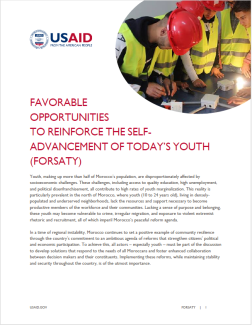Youth, making up more than half of Morocco’s population, are disproportionately affected by socioeconomic challenges. These challenges, including access to quality education, high unemployment, and political disenfranchisement, all contribute to high rates of youth marginalization. This reality is particularly prevalent in the north of Morocco, where youth (10 to 24 years old), living in densely-populated and underserved neighborhoods, lack the resources and support necessary to become productive members of the workforce and their communities. Lacking a sense of purpose and belonging, these youth may become vulnerable to crime, irregular migration, and exposure to violent extremist rhetoric and recruitment, all of which imperil Morocco’s peaceful reform agenda.
In a time of regional instability, Morocco continues to set a positive example of community resilience through the country's commitment to an ambitious agenda of reforms that strengthen citizen's political and economic participation. To achieve this, all actors – especially youth – must be part of the discussion to develop solutions that respond to the needs of all Moroccans and foster enhanced collaboration between decision makers and their constituents. Implementing these reforms, while maintaining stability and security throughout the country, is of the utmost importance.
USAID RESPONSE
USAID is working closely with different public youth-serving institutions and local civil society organizations (CSOs) to help build their capacities, facilitate citizen participation, and ensure sustainable participatory governance. USAID’s FORSATY program worked to foster social and economic inclusion of at-risk youth (10-24 years old) living in marginalized neighborhoods in the north of Morocco by providing youth-friendly services to help curb drop-out rates and increase employability, create stronger bonds within communities, and build the local capacity of youth-serving institutions. FORSATY has evolved over the years, and now includes women, peace, and security interventions and a robust community resilience and gender research learning agenda.
RESULTS ACHIEVED
- Over 28,000 at-risk youth have benefited from socio-economic reintegration services from FORSATY and 88 percent of youth participants have been successfully reintegrated into their communities or are still actively engaged in program activities, thus avoiding becoming recruitment targets for extremist networks. In addition, 8 policies proposed by the city-level Youth Leader Councils were introduced into their cities’ Communal Development Plans.
- FORSATY created 52 partnerships between partner local “One-Stop-Shop” NGOs and the private sector to provide at-risk youth with hands-on workforce experience. To date, over 5,000 at-risk youth program beneficiaries were placed in employment, paid internships, and entrepreneurships.
- FORSATY partners with local community actors to tackle deep-rooted gender issues to encourage greater female participation in school, the workforce, and extracurricular activities. FORSATY ensured a balanced representation of female youth council leaders with 34 female leaders out of the 67 in total. FORSATY’s education component served 2,011 at-risk students: 976 males and 1,035 females.
- FORSATY distributed 19,881 food baskets in Tangier, Tetouan, M’diq-Fnideq-Martil and Al Hoceima, reaching 19,587 households in need of immediate relief during the COVID-19 pandemic.
- FORSATY distributed 8,759 phone and internet credits to 4,032 vulnerable individuals, keeping them connected and active during the COVID-19 lockdown, and conducted tailored psychosocial training for 133 One Stop Shops (OSSs) staff members during the COVID-19 pandemic.
FACTS & FIGURES
IMPLEMENTING PARTNER:
- International Organization for Migration (IOM)
HOST-COUNTRY PARTNERS:
- Wilaya of Tangier-Tetouan-Al Hoceima
- National Initiative for Human Development (INDH)
- Ministry of National Education, Vocational Training, Higher Education and Scientific Research
- Entraide Nationale
- ANAPEC
- Ministry of Culture, Youth and Sports
- Local Civil Society Organizations
- Private Sector
LOCATION:
Tangier-Tetouan-Fnideq/M’diq-Al Hoceima
TOTAL BUDGET AND DURATION:
- Moroccan Community Resilience Activity (MCRA): $26 million, 2019 to 2024
- Favorable Opportunities to Reinforce the Self-Advancement of Today’s Youth (FORSATY): $12.78 million, 2012 to 2019
KEY CONTACT:
Idriss Touijer, Peace & Security Regional Advisor, itouijer@usaid.gov


